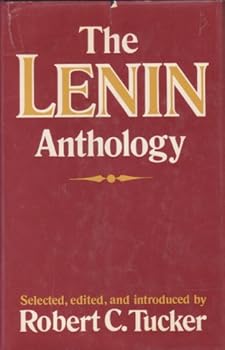The Lenin Anthology
Select Format
Select Condition 
Book Overview
Patterned after Professor Tucker's highly successful anthology The Marx-Engels Reader, this book includes those words necessary for an introduction to Lenin's revolutionary thought. Selections, where... This description may be from another edition of this product.
Format:Hardcover
Language:English
ISBN:0393055396
ISBN13:9780393055399
Release Date:April 1975
Publisher:Norton
Length:764 Pages
Weight:1.60 lbs.
Customer Reviews
1 rating
Nice compilation of Lenin's body of work
Published by Thriftbooks.com User , 17 years ago
Tucker's edited volume, "The Lenin Anthology," is a good compilation of Lenin's body of work. If one wishes a quick introduction to Lenin in one volume, this is a good work to look at. First, Lenin's real name was Vladimir Ilyich Ulyanov. The death of his older brother at the hands of the government was a key point in his life (note the brief chronology on pages xv-xxiii, from his birth in 1870 to his death in 1924). Tucker's introductory essay is useful for placing Lenin's work in context. He observes that (page xxvi): "Lenin must be understood both as a creator of a distinctive version of Marxism as a revolutionary theory and also as a person steeped in the native Russian, non-Marxist revolutionary tradition." The volume's Part I focuses on "The Revolutionary Party and Its Tactics." The single most important contribution is probably "What Is to Be Done? Burning Questions of Our Movement." This work outlines his view of the tactics of revolution under the banner of the party. Other selections are also useful to understand his tactical perspective (e.g., "One Step Forward, Two Steps Back"). Part II examines "Revolutionary Politics in a World at War." One of the best known of his works in this section is "Imperialism, the Highest Stage of Capitalism," in which work he equated capitalist countries with carrying out imperialist policies. Part II considers "The Revolutionary Taking of Power." In my view, doubtless the single most important work appearing in this section is Lenin's "The State and Revolution." This work focuses more on revolution, how to achieve it, what it means, and what of the aftermath than almost any substantial work that he wrote. This is far more a kind of philosophical work than his more tactical pieces from Part I. And so on. Other key works appearing in whole or in part: "The Proletarian Revolution and the Renegade Kautsky," "'Left-Wing' Communism--An Infantile Disorder," etc. At the end, there are some poignant letters and brief essays. Poignant among some of these: His frustration with bureaucracy holding back what he saw as the goals of revolution after the Bolsheviks had seized power; his fears regarding succession, as he lugubriously diagnosed that Stalin was not the person to succeed him (e.g., see page 728)--and his powerlessness to prevent what he feared; his essay "Better Fewer, But Better," in which he excoriated Stalin indirectly and argued for less obtrusive government and moving ahead more slowly and carefully. In the last named essay, he defined the title as (page 736): "We must follow the rule: Better fewer, but better. We must follow the rule: Better get good human material in two or even three years rather than work in haste without hope of getting any at all." Lenin was a master of political invective, attacked his enemies mercilessly (even if just in his writing). He was a professional revolutionary who also was, on occasion, capable of interesting political reflections. If one wish






